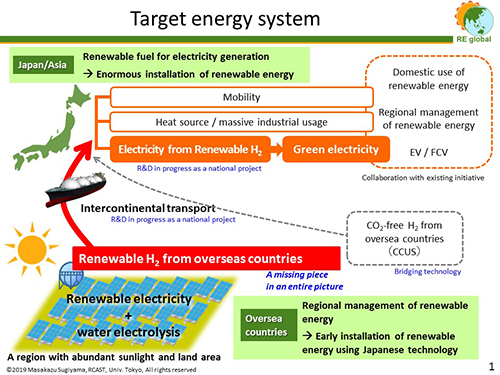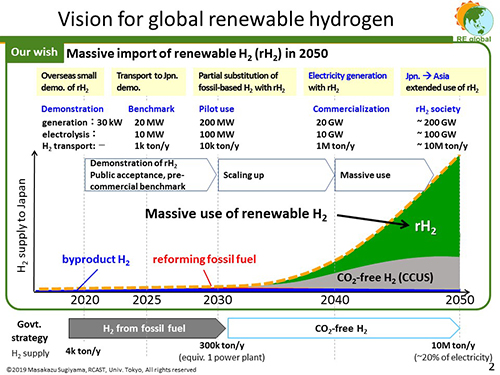Establishment Background
The Challenge of Decarbonising Energy Systems
We at the University of Tokyo aim to create an environment for research and education in which a diverse range of people can demonstrate their abilities through strengthening social and international collaboration. We also believe that universities should be the birthplace of the societal change needed to achieve both Sustainable Development Goals (SDGs) and economic growth. In particular, in order to achieve multiple SDGs at the same time, it is especially important to deliver universal sustainable energy.
In October 2020, the Japanese government declared its ambition to reduce greenhouse gas emissions to net zero by 2050, setting Japan on course to become a carbon-neutral society. The Green Growth Strategy is key to helping Japan achieve this ambitious goal. The aim of this new strategy is to promote green growth to transform industries and the broader economy. The Green Growth Strategy features ambitious goals, includes action plans for sectors with high growth potential and clarifies the resources available to encourage private-sector investment.
(*)‘Social Cooperation Research Unit’ refers to a department established at the Research Center for Advanced Science and Technology at the University of Tokyo which uses expenses received from private institutions to conduct joint research into matters of high public interest. Unlike corporate-donated laboratories, it is established as a part of collaborative research.
Procurement of Renewable Hydrogen from Overseas

In the Basic Hydrogen Strategy, CO2-free hydrogen is assumed to be either produced overseas from fossil resources with underground CO2 sequestration, or hydrogen derived from renewable energy sources. However, there are currently limited prospects for the large-scale renewable hydrogen production required to build a truly sustainable energy cycle for the planet. Considering the restrictions on the potential to introduce renewable energy in Japan (sunlight hours, installable area, power grid, uneven distribution of large-scale consumption areas due to industrial/population distribution, etc.), we believe it is essential to build a ‘global network of renewable fuels’, in which hydrogen is produced and imported into Japan using renewable energy sources such as solar and wind that can be obtained overseas at low cost and in large quantities.
Already in Australia, governments and leading companies have launched a project to export renewable fuels, advocating the removal of coal-fired power and the transformation of their industrial structure. Given the timing of this global movement, it is appropriate for Japan, a country with developed hydrogen-related technologies, to proceed with industrial-academic-governmental collaboration efforts regarding the import of renewable hydrogen. We believe it is necessary to develop the technology to mitigate the cost of large-scale renewable hydrogen production in overseas countries rich in renewable energy resources such as Australia, to create scenarios for introducing renewable fuels, and to conduct research on the introduction and expansion of energy management technology using hydrogen etc., all of which must be done while maintaining a favourable relationship with future renewable fuel-exporting countries.
Objectives and Activities of the Social Cooperation Research Unit

Our ultimate target is to create the majority of the Basic Hydrogen Strategy’s 2050 goal of 10 million tons of hydrogen per year from renewable sources. Producing this large amount of hydrogen through the electrolysis of water will require the capacity to generate several hundred gigawatts of renewable electricity. Even though this constitutes almost half the photovoltaic capacity that has been installed so far, there is still sufficient suitable land available overseas for the introduction of renewable energy.
Meanwhile, considering the technological development necessary to deploy a 100 GW class power generation and water electrolysis plant by 2050, it is assumed that an initial ten-megawatt class plant demonstration must be started in a suitable overseas location around 2025, and we therefore strongly believe that it is necessary to commence early research immediately.
One activity of this Social Cooperation Research Unit is to proceed with the conceptual design and technological economic analysis of large-scale renewable energy hydrogen production plants, including photovoltaic power generation, referring to the results of the kilowatt class demonstration of hydrogen production currently underway both domestically and overseas . We will also consider the manifold merits of renewable energy that cannot be assessed by simple monetary value, consider measures for allowing renewable energy to be accepted by society, and examine social system scenarios in which renewable fuel provides the main source of energy. Furthermore, we will investigate regional renewable energy management in areas where overseas renewable energy introduction is appropriate, which will serve as bases for exporting renewable energy to Japan in the future, and identify issues related to systems and policies for augmenting the production potential of renewable fuels.
We will conduct research aimed at building a platform for researching the social systems and technological infrastructure for the global procurement of renewable fuels, and promote open innovation through international industrial-academic-governmental collaboration including the Research Center for Advanced Science and Technology at The University of Tokyo and nine participating companies, together with academic partners and governments overseas.
In addition to this, we will actively develop demonstrations converting renewable energy to fuel for international distribution and will foster understanding and eager anticipation for renewable fuels at a public level.
(*2)A 0.4 kW solar power generation and hydrogen production is underway at the Nishioka Laboratory of Miyazaki University, which has a cooperative relationship with this research unit. At the Queensland Institute of Technology, Australia, in a similar cooperative relationship, a hydrogen production demonstration in which a storage battery and a water electrolyser are connected to a 100 kW solar power plant has been commenced with the support of the Australian government.


